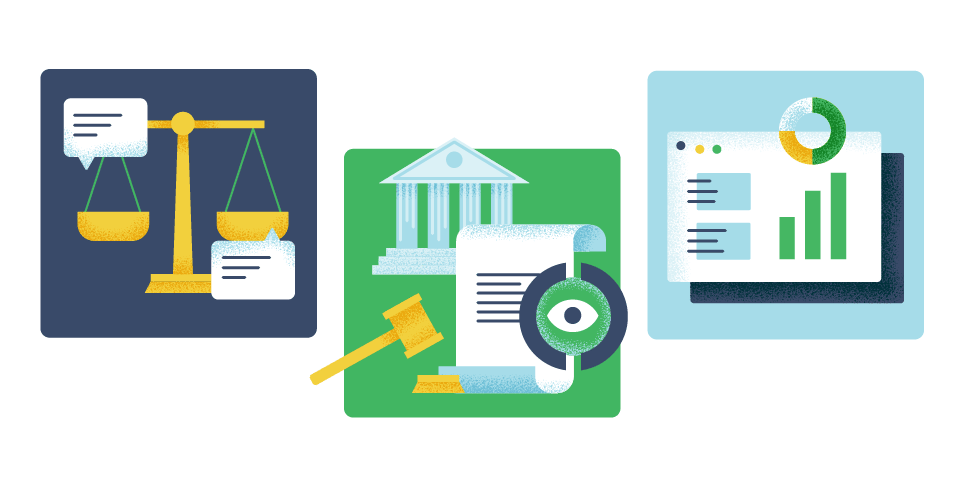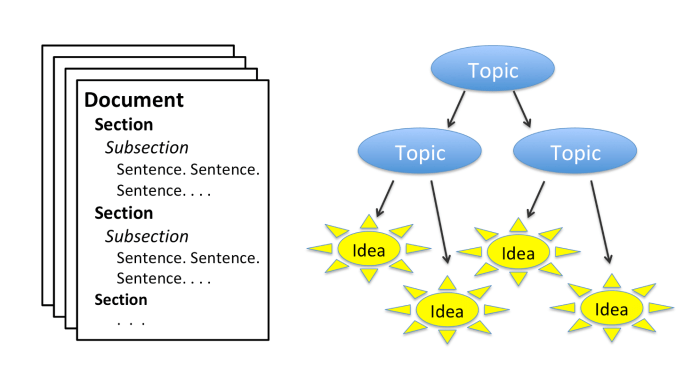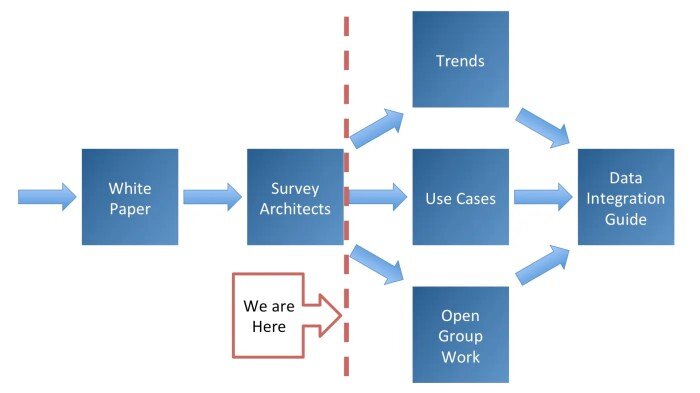Natural Language Processing for Development

As a potent technology with numerous applications, Natural Language Processing (NLP) is rapidly gaining prominence. Regarding standards development, there are some ideas on how it can be utilized, and an invitation is extended to join The Open Group’s work that incorporates it.

NLP Can Extract Topics and Ideas from Document Text
The Power of Natural Language Processing
Recently, there has been a tremendous amount of excitement surrounding ChatGPT, which incorporates the latest advancements in Natural Language Processing (NLP) technology into a chatbot. It is available for free to anyone who wishes to give it a try, and based on the current level of discussion on email and social media, it seems that nearly everyone has done so. The interest in ChatGPT is not limited to tech-focused publications, as mainstream media outlets such as CNN, The Times (in London), and Germany’s Bild have all featured articles discussing its potential impact on their audiences. Experts anticipate that it could revolutionize various industries, ranging from healthcare to real estate, and have far-reaching effects on society as a whole.
Several industries are already experiencing significant disruption, with chatbots playing an increasingly prominent role in sales and technical support. This is evident to anyone who has recently visited a product website. However, ChatGPT is capturing attention due to its ability to function on a more general level, much like a human being, and respond to any prompt on any subject matter. Although it utilizes similar technology to sales and support chatbots, the key distinction lies in its large model, which has been trained on a much larger dataset, making a significant impact.
The Limitations of Natural Language Processing
While the technology behind ChatGPT is impressive, it does have some limitations. Although it can create commodity content based on previously documented information, it lacks the accuracy and expertise of a human professional. The most effective sales and support chatbots recognize their limitations and transfer the conversation to human agents when necessary.
The true strength of ChatGPT lies in presenting concepts extracted from existing material, rather than generating entirely new ideas. For instance, it could produce a detailed summary of quantum theory, but it is unlikely to invent it. When asked if it could devise an approach superior to quantum theory, ChatGPT responded by stating, “As an AI language model, I am not capable of conducting experimental research or contributing to the evolution of a physical theory such as quantum mechanics.” This sentiment could not have been expressed more accurately.
ChatGPT lacks genuine logical reasoning abilities, as demonstrated by its inability to solve a riddle such as “Mike’s Mum has four children. Three of them are Tom, Dick, and Harry. What is the name of her fourth child?”
Furthermore, some of its responses may contain factual inaccuracies. This is not unexpected, given that the dataset used to train the model may include false statements, and its probabilistic approach may favor a more likely answer over a less probable but correct one.
In the 1960s, an AI program named Eliza generated a comparable level of excitement. It was capable of producing relatively convincing responses to prompts by identifying patterns and phrases and utilizing an algorithm to generate potential conversation follow-ups. For instance, when given the prompt “I’m afraid of artificial intelligence,” it might reply, “How long have you been afraid of artificial intelligence?”
However, ChatGPT takes Eliza to the next level. Its responses are not solely based on the prompt but also on the vast dataset on which it was trained. Its answers are generated by a complex probabilistic model rather than a straightforward algorithm, making it a more advanced and sophisticated system.
Collaborative Intelligence of Natural Language Processing
Chess grandmasters had consistently defeated machines until the mid-1990s when supercomputer Big Blue defeated grandmaster Gary Kasparov. This event sparked a significant discussion on the topic of human versus artificial intelligence. Kasparov himself has pondered the matter deeply and has explored the potential for collaboration between humans and AI. In collaboration with David De Cremer, Kasparov details an experiment in the Harvard Business Review that demonstrated how a well-organized partnership between humans and machines can outperform not only the best humans but also the best machines. They conclude that AI should enhance human intelligence rather than supplant it.
Currently, it appears that utilizing AI to enhance human intelligence is the path ahead. Machines can process a much larger quantity of information than humans and present it in a way that humans can comprehend. They can encapsulate and express a consensus opinion. However, humans contribute a moral and ethical component, as well as some “common sense,” and can steer the machines towards what is optimal for their societies. They are more adept at generating new ideas and formulating novel theories.
Use in Standards Development
Despite its drawbacks, the Natural Language Processing technology that forms the foundation of ChatGPT possesses significant potential for transformative disruption in various domains. One of these areas is standards development. In the past year, they delivered a talk to The Open Group Architecture Forum on the potential applications of National Language Processing. The recent surge in ChatGPT’s prominence indicates that the opportunities are even more promising and could materialize sooner than anticipated.
Standards provide a shared basis for communication, which is crucial for effective collaboration. Over time, their scope has broadened. For instance, The Open Group’s UNIX® standard facilitated cooperation among software developers by establishing a standardized operating system. Similarly, The Open Group’s TOGAF® standard assists Enterprise Architects in working together by outlining a structured approach to architecture development.
During its 2020 event in San Antonio, Texas, The Open Group introduced the concept of Standards as Code, which involves executable code as a standard as long as it undergoes consensus-led change control. This approach acknowledges the potential of software to serve as practical standards, including language models like ChatGPT. This new method called Standards as Language Models could be the most disruptive change in the standards industry since the definition of the meter by the French Academy of Sciences. Additionally, natural language processing has the potential to support the development and utilization of standards. The Open Group Data Integration Work Group is currently exploring the possibilities of using NLP in this area.
The Data Integration Work Group
The Data Integration Work Group is currently in the process of developing a Guide to Data Integration that utilizes The Open Group standards. As part of this effort, the group is conducting research on use cases and trends related to data integration, and analyzing The Open Group standards to determine which clauses are relevant to the guide.

The Data Integration Work Group is utilizing a prototype Ideas Browser to assist in their research. This tool uses ChatGPT’s language model to generate summaries of web pages, allowing users to browse topics and ideas without reading through all the text. The goal is not to replace humans but to help them review more material quickly and make better decisions faster. The workgroup is open to new members who are interested in contributing to cutting-edge standards development, and anyone who is a member of the Architecture Forum is welcome to participate. To join, simply contact the Forum Director, Dan Hutley.

Chris Harding, Ph.D., is the founder and principal of Lacibus Ltd, a company that offers services based on data-centered architecture and virtual data lakes. The concept of the company was developed during Chris’s time as Director of The Open Group’s Open Platform 3.0™ Forum.
Chris Harding worked at The Open Group for several years, providing support to its member activities in areas such as data communications, directory interoperability, web, service-oriented architecture, cloud computing, and more. He was the lead author of The Open Group Guide: Cloud Computing for Business, contributed to other publications by The Open Group, and has authored numerous online articles. He has a keen interest in Enterprise Architecture and was involved in the early development of the TOGAF® Standard, a standard of The Open Group. Currently, Chris is a member of the Work Group on TOGAF Supporting the Digital Enterprise, and his primary focus is on data platforms. He keeps track of various industry initiatives related to this field and actively participates in The Open Group Data Integration Work Group.
Prior to joining The Open Group, Chris worked as a data communications consultant and also served as a software engineer and team leader. He holds a Ph.D. in Mathematical Logic. Currently, he resides with his wife in Lincolnshire, UK, where he enjoys pursuing his hobbies of gardening and photography.
Conclusion
The potential for Natural Language Processing in Standards Development is significant and exciting. The ability to use AI to augment human intelligence, especially in the context of standards as code and language models, has the potential to greatly improve collaboration and decision-making. With ongoing research and development, the future of standards development looks brighter than ever.
Here at CourseMonster, we know how hard it may be to find the right time and funds for training. We provide effective IT Certifications that enable you to select the training option that best meets the demands of your company.
For more information, please get in touch with one of our course advisers today or contact us at training@coursemonster.com




Comments ()